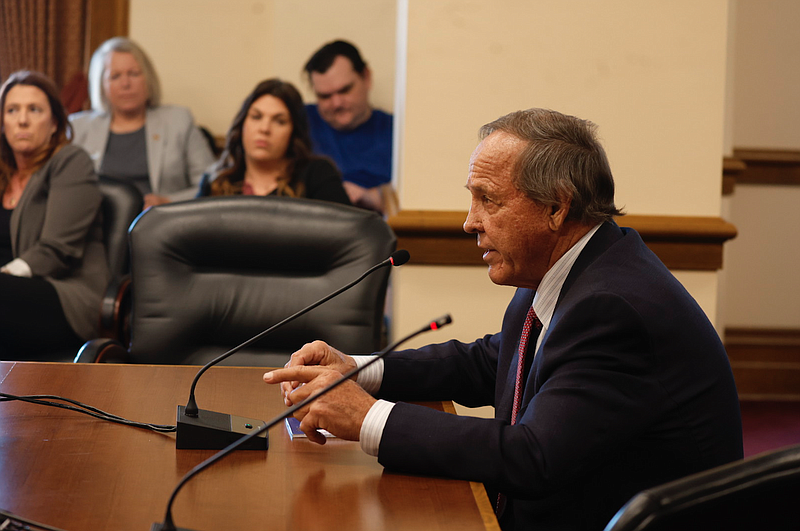A Senate panel on Monday endorsed bill that would allow a person who received a “gender transition procedure” as a minor to sue the health professional who performed the procedure.
Senate Bill 199, by Sen. Gary Stubblefield, R-Branch, passed in a voice vote in the Senate Committee on Judiciary with audible dissent from Sen. Clarke Tucker, D-Little Rock.
Stubblefield said his bill is needed to protect children from "gender transition procedures" including puberty blockers and reassignment surgeries, which he characterized as “chemical castration” and “mutilation.”
Supporters questioned the ability of minors to consent to procedures covered by the bill, and noted the legislation would not outlaw “gender transition procedures” but would provide legal recourse for those who receive the procedures.
Opponents of the bill argued it would unfairly limit treatments for transgender people, especially those with mental illness, and could violate the equal protection clause of the U.S. Constitution. Critics also noted that state code already includes medical malpractice laws.
Testimony during the more than two hours of discussion became heated at times. Sen. Matt McKee, R-Pearcy, drew disapproval from many of those gathered when he asked a transgender woman who spoke against the bill if she had a penis.
Stubblefield’s bill defines “gender transition procedure” as medical procedures that aim to alter “or remove physical or anatomical characteristics or features that are typical for the individual's biological sex.” Procedures covered by the bill also include those seeking to instill “or create physiological or anatomical characteristics that resemble a sex different from the individual's biological sex.”
The bill specifically points to “puberty-blocking drugs,” “cross-sex hormones” and “genital or nongenital gender reassignment surgery.”
Under the bill, a healthcare professional who performs a “gender transition procedure” is liable to the minor if the minor is “injured, including without limitation any physical, psychological, emotional, or physiological injury, by the gender transition procedure, related treatment, or the after effects of the gender transition procedure or related treatment.”
A minor injured by a “gender transition procedure” or a representative for the minor would be permitted by the bill to bring a civil action against the health professional for declaratory or inductive relief, compensatory damages, punitive damages and attorney’s fee and costs.
Legal action under the legislation would have to be taken within 30 years of the minor turning 18 or within 30 years of when the minor would have turned 18 if the minor died before turning 18. The current statute of limitations for most medical malpractice cases in Arkansas is two years, according to state law.
The bill includes a “safe harbor” section that would provide healthcare professionals with a defense against legal action. Among other requirements, healthcare professionals would have to document a minor’s “perceived gender or perceived sex for two (2) continuous years” and receive the voluntary and informed consent of the minor and their parents before performing a procedure.
For minors who "suffered from a mental health concern,” at least two healthcare professionals, including at least one mental health professional, would have to certify in writing that “the gender transition procedure was the only way to treat the mental health concern.”
At least two professionals, including at least one mental health professional, also would have to certify in writing that “the minor suffered from no other mental health concerns, including without limitation depression, eating disorders, autism, attention deficit hyperactivity disorder, intellectual disability, or psychotic disorders.”
In its definition of “gender transition procedures,” the bill excludes several treatments including services to "persons born with a medically verifiable disorder of sex development" and any "procedure undertaken because the individual suffers from a physical disorder, physical injury, or physical illness that would, as certified by a physician, place the individual in imminent danger of death or impairment of major bodily function unless surgery is performed."
